URology




Jean Joseph, M.D., M.B.A., F.A.C.S. Winfield W. Scott Professor and Chair Department of Urology Professor of Oncology Wilmot Cancer Institute University of Rochester Medical Center






Jean Joseph, M.D., M.B.A., F.A.C.S. Winfield W. Scott Professor and Chair Department of Urology Professor of Oncology Wilmot Cancer Institute University of Rochester Medical Center

This past June, the Department of Urology held Men’s Health Day, which began as an annual gathering back in 2004 and, like many activities interrupted by the pandemic, returned to an in-person event in 2022. The event brings together a multi-disciplinary team of UR Medicine experts to address a wide range of topics, focusing on how older men can prolong a healthy and active lifestyle. In our cover story, you will learn how we are bringing this message to the community, with the understanding that nutrition, exercise, and cardiovascular health are all connected with sexual health.
Our Department continues to grow and increase access to specialized urological care for patients across Upstate N.Y. Two new clinical facilities in Batavia and Canandaigua, along with new faculty hires Drs. Thomas Osinski and Nitin Sharma, will strengthen our regional network of providers, deliver care close to home, and enable patients to access UR Medicine’s advanced care services. We also welcome Dr. Phillip Rappold, who bolsters the ranks of our Rochester-based team of urologic oncologists.
As an academic medical center, we understand the outsized role our institution plays in training and shaping the future healthcare workforce. In this issue you will read about our Department’s sub-internship scholarship for fourth year medical students, which was created to help build a more diverse pipeline of trainees entering urology.
On November 5, the Department of Urology, in partnership with the Wilmot Cancer Institute, will host our 4th Bladder Cancer Symposium. This year’s distinguished panel of national experts will focus on advances in non-muscle invasive bladder cancer research and care driven by the ongoing BCG shortage.
Last May, the AUA held its annual meeting in New Orleans and our own Dr. Ed Messing followed in the footsteps of Drs. Abraham Cockett and Irwin Frank to become the third University of Rochester faculty to hold the position of president of the AUA. It was wonderful to see so many alumni, friends, and colleagues at the reception held in his honor at the conference. We look forward to seeing many more at the upcoming meeting in Chicago.
Men’s Health Day would not be possible without the support of the Weinberg Family. Their gift, along with the generosity of many others, enables the Department to better serve our patients, advance our knowledge of urological disorders, and train the next generation of urologists. This philanthropy embodies the University of Rochester’s motto Meliora, to strive and make the world “ever better.”
On the cover: On the cover: Timothy Holahan, D.O., C.M.D., April Ho, R.D., C.P.T., and Scott Gabrielsen, M.D., Ph.D.
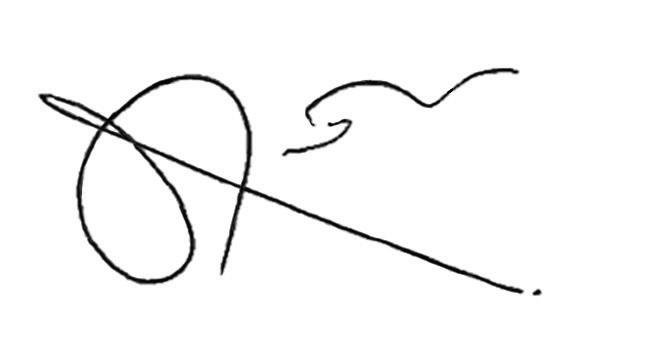
Editor: Mark Michaud
Contributor: Tim Cook
Design: Brittany Colton Photography: John Schlia
URMC’s Department of Urology explores problems with various organ systems to address men’s health more broadly – with the overall goal of improving overall health and quality of life. The Department engages health practitioners from a variety of disciplines within URMC to work as a team to implement this approach, ranging from urology to gerontology, cardiology, dermatology, nutrition and ophthalmology.
This interdisciplinary team takes its message about the importance of healthy aging out into the community. One example is the Urology Department’s annual Men’s Health Day conference. The 2022 event was held in June and featured presentations on such topics as skin cancer treatment and prevention, eye health, healthy aging, spine rehab, management of low testosterone and erectile dysfunction, and healthy eating.
“We held this year’s event close to Father’s Day, but we view every day as Father’s Day,” said Jean Joseph, M.D., chair of URMC’s Department of Urology. “Our core mission is community education to inform men what they need to do to promote their health as they age.”
“This interactive event has been invaluable for hundreds of men in our area, many of whom have attended for several years,” Joseph added. “We will continue to hold this important event for years to come, thanks to the generous support of a valued donor.”
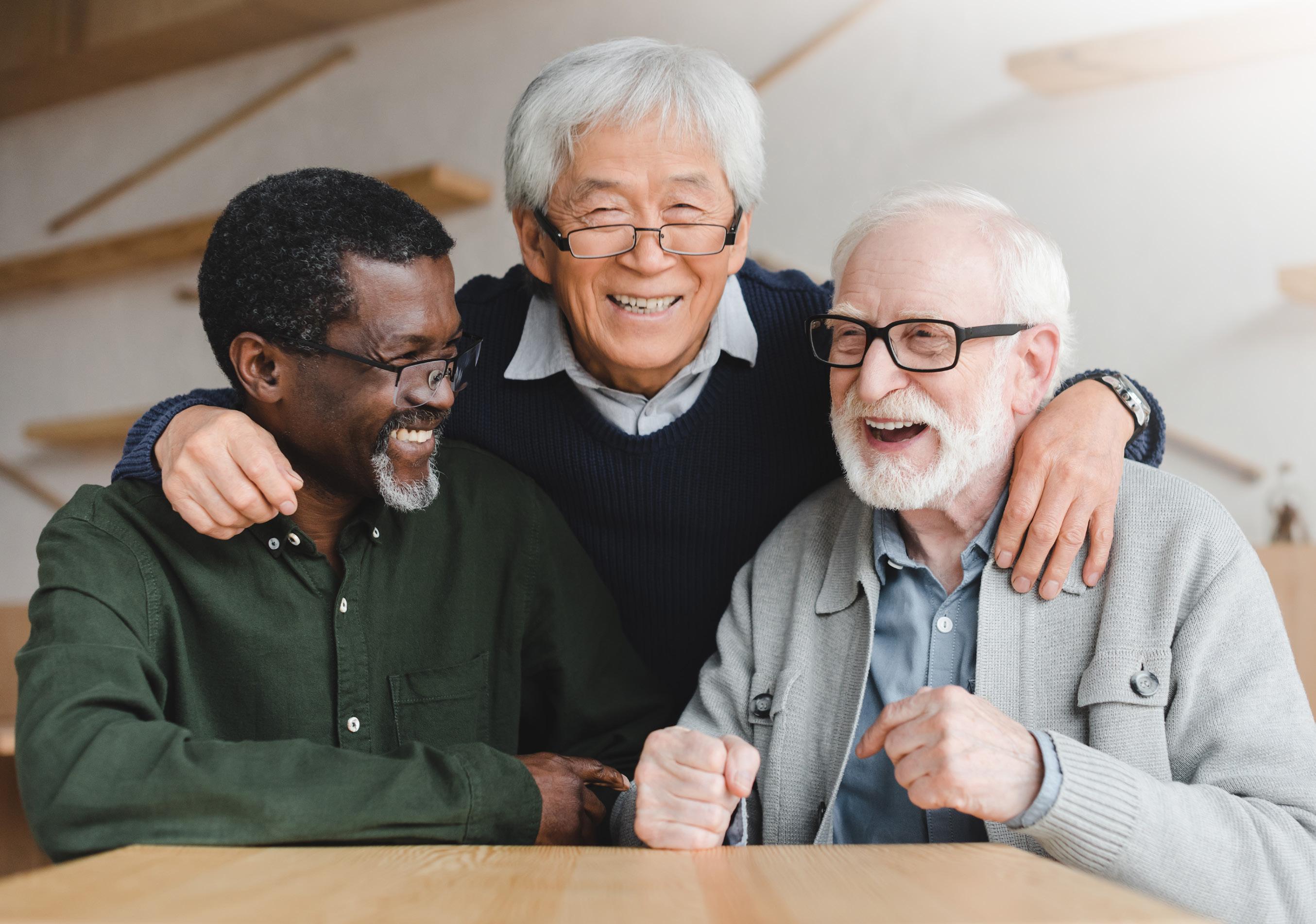
During his presentation on erectile dysfunction and low testosterone, J. Scott Gabrielsen, M.D., Ph.D., an
andrology and infertility specialist, focused as much on prevention of problems as on treatment. He highlighted that the best thing men can do to prevent these issues is to take care of their overall health.
The Department’s holistic approach recognizes that individual issues are not always independent of one another – and, in fact, they may be fully tied together. “What’s good for a man’s heart is good for their health, for their erections, for their testosterone and for their sperm quality,” Gabrielsen said. “For ED, lifestyle modification and medications changes
can help men maintain and improve baseline function, whereas other treatments like sildenafil (Viagra) or tadalafil (Cialis) are Band-Aids to compensate for decreased function.”
According to Gabrielsen, ED and low testosterone are two issues that lead younger men to seek medical attention. This presents a unique opportunity to intervene and reinforce the importance of prevention, such as getting screened for diabetes.
“It’s important for men to understand that testosterone levels decrease with age, but most symptoms of low testosterone are due to other causes,” he added. “Improving overall health will have benefits not only for sexual function but will also help prevent a myriad of other health problems down the road.”
While aging impacts everyone, there are specific health issues that arise that affect men physically, mentally and emotionally. Learning how to stay healthy longer was a large part of the Men’s Health Day discussion.
“We can’t stop aging, of course, but we can help men stay functional as long as possible,” said Timothy Holahan, D.O., C.M.D., URMC Division of Geriatrics and assistant professor of Medicine, during his presentation on steps toward healthy aging. “Part of that effort is educating patients on such things as the impact of high cholesterol and high blood pressure on heart health.”
Helping men age healthier may not seem like the role of a urologist. Yet, because urologists care for male patients many times throughout their lives, they have more opportunities to engage with their patients.
“Urologists have a unique role in men’s health, and they have a greater impact on healthy aging than they probably realize,” Holahan said. “Following a man’s health for many years, a urologist may be able to pick up on other issues, such as memory loss or cognitive decline, which can be immensely helpful in overall patient care.”
“When looking at dementia, people think about how to prevent it or how to slow its progression. How you do that is by looking at a man’s health across the board – and that involves a urologist,” he added.
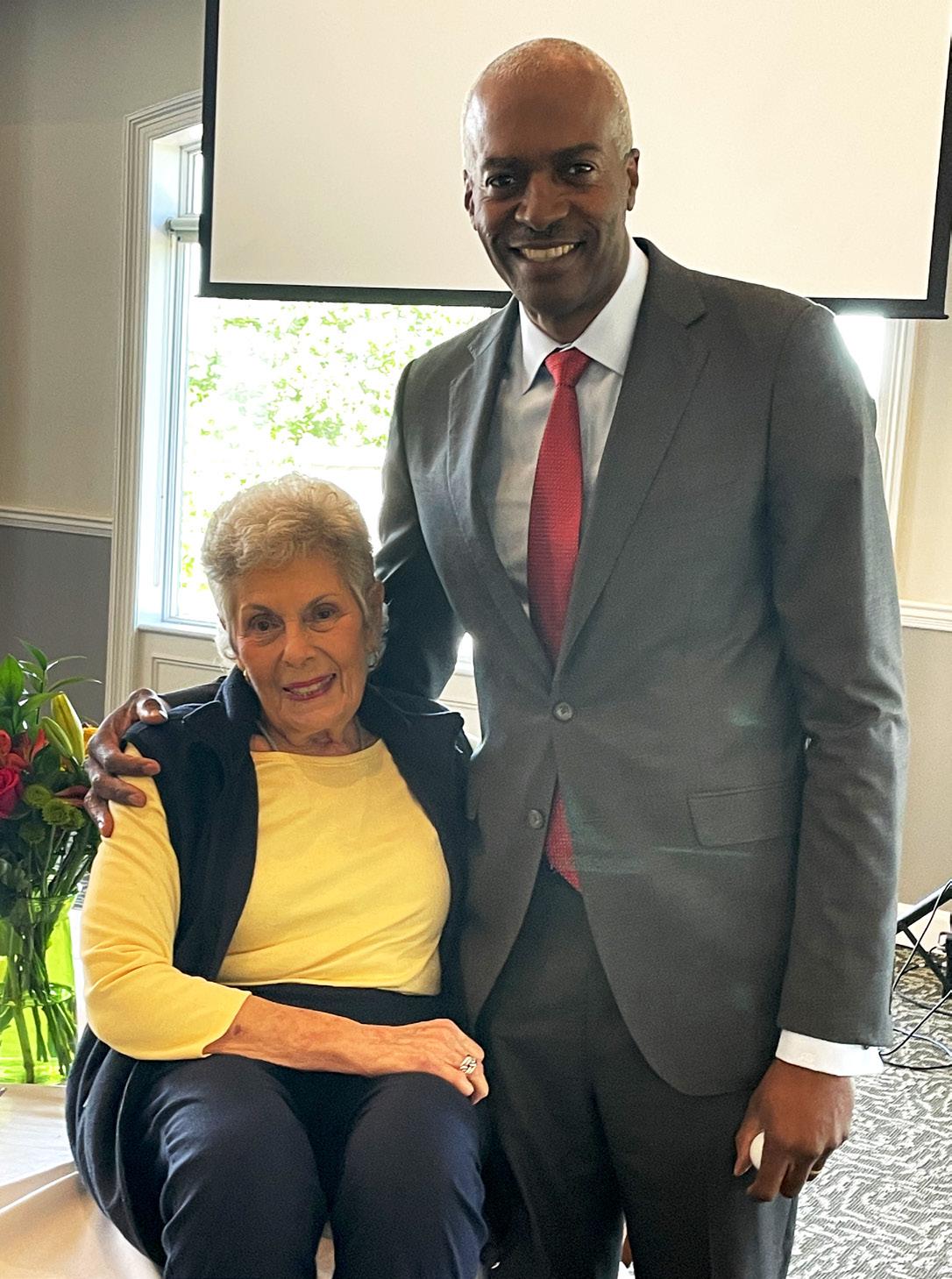
When it comes to healthy eating, men often receive societal pressures to “achieve,” similar to many other areas of life, according to April Ho, R.D., C.P.T., a registered dietitian and certified personal trainer with URMC’s Center for Community Health & Prevention. Whether it is the pressure to achieve
career status, financial success, or a diet that fuels the body and builds muscle, the cultural messaging often promotes productivity and black and white thinking.
“Seeing food as fuel and as a means of simply building muscle or losing weight misses the fact that for as long as the human race has been alive food has been part of ritual, social gathering and holidays as well,” Ho said. “Reducing food to solely its physical health benefits promotes an incomplete perspective that ultimately is often demotivating for patients.”
During the Men’s Health Day presentation, Ho covered the basics on healthy eating for retired men. This includes the need to eat from a portion plate that is equal parts fruit, vegetable, protein and starch, getting more calcium and vitamin D, and eating three servings of dairy and 30 grams of fiber and more each day.
While important to educate men about healthy eating, central to that is explaining the meaning of balance. Dietitians help patients understand tradeoffs they can make in their diets to make room for all their favorite foods.
“It is extremely valuable that we get to collaborate with urologists in an effort to reframe the all-or-nothing approach to healthy eating,” Ho added. “Dietitians can help men overcome the barriers to healthy eating – and to social and emotional health - because we get a good amount of time with our patients.”
As part of the inter-specialty approach, dieticians also work in tandem with the Department’s Comprehensive Kidney Stone Treatment Center on stone prevention.
“Our health care system is overtaxed, and patients demand and expect a lot from their providers,” Ho said. “Through our interdisciplinary approach, we are increasing collaboration among URMC departments and divisions, but, most importantly, we are improving patient outcomes immensely.”
“As we always do when we target urologic cancers, stone disease, or other urologic problems, our approach to community education is also to be multi-disciplinary, bringing our experts together to benefit our patients and our community,” said Joseph. “The best education, the best care, and the best research are multi-disciplinary.”
As part of fulfilling the URMC’s commitment to diversity, equity and inclusion, the Department of Urology offers a sub-internship scholarship award program to expose the urology discipline to more students from diverse backgrounds.
Offered to fourth-year medical students from across the country interested in pursuing a surgical/urological career, the program pairs students with a faculty member for clinical mentoring and with a resident mentor. They also are exposed to research opportunities during their month-long rotation. Selected students receive a stipend to assist them with their travel and housing expenses – costs that add up for students as they visit universities they are considering for their residencies.
“This program complements the many initiatives we are undertaking at URMC to help increase racial, ethnic and gender
diversity, through the University’s Institutional Office of Equity and Inclusion,” said Department Chair Jean Joseph, M.D., M.B.A. “Our goal is to provide more opportunities for underrepresented medical students and to build a more diverse pipeline of medical students who will make urology their career choice.”
Joseph noted that the program also exposes students to the Rochester, N.Y., area, a place they may not be familiar with to consider for their residency. Students need to apply for the scholarship, which is highly selective to offer students the best possible experience with access to faculty, research and the operating room.
“Our sub-internship diversity and equity scholarship presents an exciting opportunity for medical students, as we are giving more access to the urology field for wonderful applicants who may not have the funds to travel here and stay in Rochester for a month,” said Scott Quarrier, M.D., M.P.H., Assistant Professor - Department of Urology. “It has been rewarding to see more applicants to our sub-internship program from across the country.”
“Our goal is to provide more opportunities for underrepresented medical students.”
Two new state-of-the-art clinical facilities and faculty hires are the latest example of UR Medicine’s growing geographic presence and commitment to deliver specialty urological care to patients across Upstate N.Y.
“Our focus is expanding the capacity to provide patients access to care when they need it, close to home, and delivered by providers known to the community,” said Jean Joseph, M.D., chair of the UR Medicine Department of Urology. “Our practice of staffing clinics with providers either locally based or who consistently practice in the community, means patients are able to maintain a consistent relationship with their local care team, while at the same time accessing UR Medicine’s advanced care services.”
In May 2022, UR Medicine opened the doors on a new multi-specialty clinic in Batavia, N.Y. The new $5.4 million, 24,455-square-foot Batavia Campus has increased access to specialist and primary care for patients in Genesee, Orleans, and Wyoming counties. The facility brings together several specialty clinics, including a general Urology clinic, and primary care into one locations, along with on-site lab services. Anchored by Joy Michaelides, M.D., and physician assistant Jason Donovan, the Department has had a presence in Batavia since August of 2017.

The Department of Urology is expanding its clinical presence in the Finger Lakes Region. Since the acquisition of Paul Shapiro, M.D. clinical practice in the winter of 2016, UR Medicine now has three full-time urologists – Jared Wachterman, M.D., Shlomi Tapiero, M.D., and Diane Lu, M.D. – and a compliment of four APPs located in Canandaigua, N.Y. Starting in July 2023, Thomas Osinski, M.D. will join the team to bring the complement of physicians to four. To accommodate this growth as well as the complexity of the community’s need for services, a new Urology
Clinic is under construction in Canandaigua and scheduled to open in the spring of 2023. The clinic will relocate and double the size of the current outpatient clinic. This location will offer the full spectrum of urologic services currently available at our Brighton, N.Y., ambulatory location, further expanding upon our charter of allowing patients access to the location and care team within their community.
Nitin Sharma, M.D., is a general urologist, joining the Southern Tier urology team and partnering with Zaheer Alam, M.B.B.S., and physician assistant Chelsea Jones practicing at St. James Hospital in Hornell, N.Y. Sharma will expand the practice started by Diva Ajay, M.D., in the Fall 2019. Ajay will continue to maintain a clinical presence along with Sharma, ensuring comprehensive care and access is available to the Hornell community. The Department has a team of 28 adult and pediatric clinical faculty and 24 APPs, providing urological care at 14 hospital-based and out-patient clinical locations.
The URMC Department of Urology held an alumni reception at the AUA Annual Meeting in New Orleans in May. The event was held in honor of Edward Messing, M.D., who formally assumed the position of President of the AUA at the meeting. Messing is the third URMC urologist to serve as president of AUA.
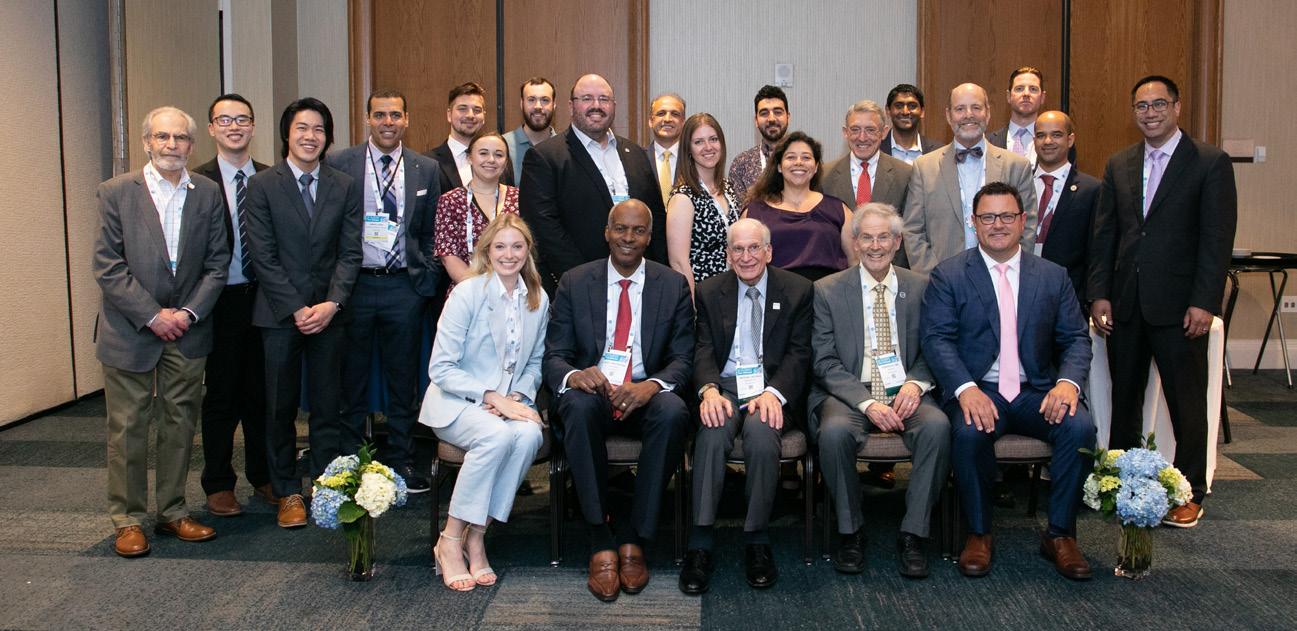
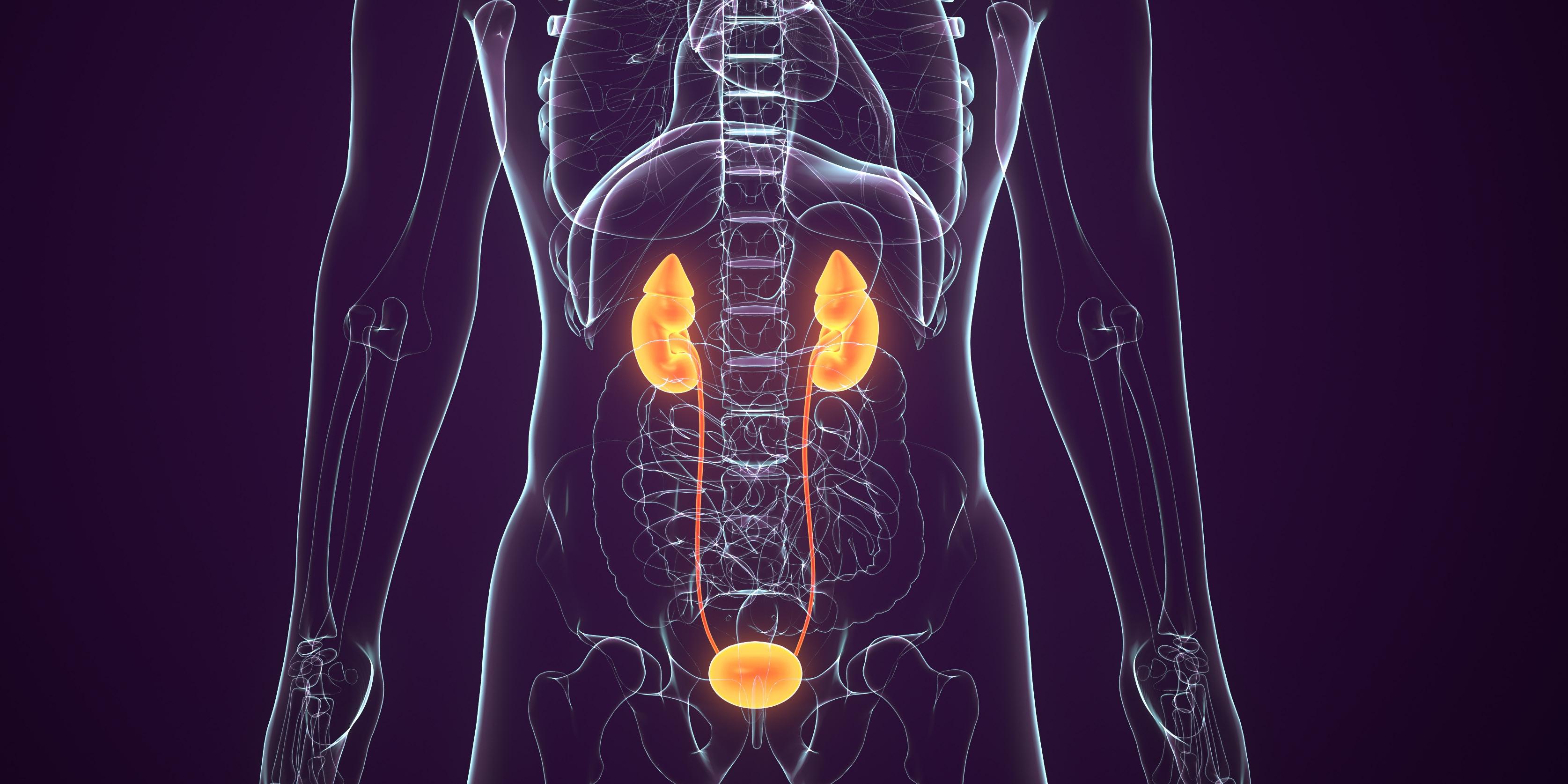
The URMC Department of Urology’s 4th Annual Bladder Cancer Symposium, will address a number of clinical advances and late-stage clinical trials for the treatment of non-muscle invasive bladder cancer (NMIBC) with a focus on treatment alternatives when bacillus Calmette-Guérin (BCG) is not available, and for the approximately 40 percent of patients for which the therapy fails. Global demand and manufacturing constraints continue to limit the supply of BCG, the mainline treatment for NMIBC. These ongoing BSG supply challenges have prompted new academic-industry drug development partnerships to identify alternative therapies. At the same time, researchers are making significant progress in identifying new standards of care and promising experimental therapies for NMIBC patients who are not responsive to BCG treatment, an area of active research at URMC.
A national panel of leading urological cancer researchers and clinicians will discuss these topics.
• Edward Messing, M.D., University of Rochester – Introduction/ BCG Unresponsive Disease
• Michael O’Donnell, M.D., University of Iowa – Gemcitabine Docetaxel for BCG Naïve and BCG Failures
• Sam Chang, M.D., Vanderbilt University – QUILT Clinical Trial
• James McKiernan, M.D., Columbia University – Phase I Intravesical Cabazitaxel, Gemcitabine, and Cisplatin
• William Tabayoyong, M.D., University of Rochester –Cystectomy for T1HG and BCG Failures
• Jason Efstathiou, M.D., D.Phil., Harvard University – Radiation for Bladder Cancer
• Brendan Guercio, M.D., University of Rochester – Advances in Neoadjuvant Treatment
The symposium will be held on Saturday, November 5 from 9am –12pm EST. This is an online event only. For more information and to register, visit https://na.eventscloud.com/website/44517/
The University of Rochester School of Medicine and Dentistry is accredited by the Accreditation Council for Continuing Medical Education (ACCME) to provide continuing medical education for physicians.
The University of Rochester School of Medicine and Dentistry designates this live activity for a maximum of 2.75 AMA PRA Category 1 Credit(s)TM. Physicians should claim only the credit commensurate with the extent of their participation in the activity.
University of Rochester Medical Center
Department of Urology
601 Elmwood Avenue, Box 656 Rochester, NY 14642
Jean V. Joseph, MD, MBA, FACS
Professor of Urology and Oncology
Winfield W. Scott Professor and Chair of the Urology Department
Divya Ajay, MD, MPH
Assistant Professor of Urology Zaheer Alam, MD
Assistant Professor of Clinical Urology
Jathin Bandari, MD
Assistant Professor of Urology
Jonathan Bloom, MD
Assistant Professor of Clinical Urology
Jimena Cubillos, MD
Associate Professor of Clinical Urology and Pediatrics
Director of Quality Improvement Vice Chair of Quality, Safety, and Patient Outcomes
David Diamond, MD
Professor of Urology & Pediatrics
Jonathan Flax, MD
Research Assistant Professor of Urology
Thomas Frye, DO
Associate Professor of Urology and Oncology
Associate Director, Clinical Trials Vice Chair of Clinical Affairs
Joseph Gabrielsen, MD, PhD
Assistant Professor of Urology
David Gentile, MD, FACS
Professor of Clinical Urology
Chief of Urology, Highland Hospital Ahmed Ghazi, MD, MSc
Associate Professor of Urology
Co-Director, Endourology, Robotic/ MIS Fellowship Director, Simulation Innovation Lab
Rajat Jain, MD
Assistant Professor of Urology
Yi-Fen Lee, PhD
Professor of Urology, Oncology, Pathology and Laboratory Medicine
Meredith
Jamie
Katie
Dan Barney, PA
Amy Beyrle, PA
Amanda Buckner, PA
Jamie Connor, NP
Jason Donovan, PA
Michelle
Kim
Samantha
Shawna
Matthew Kuhl, PA
Victoria Mesko, NP
NONPROFIT ORG U.S. POSTAGE PAID UNIVERSITY OF ROCHESTER PERMIT 780
Cassandra
Emily
Erin
Alexandra
Claire Smith, PA
Kristin Smith, PA
Melinda Westbrook, NP
Diane Lu, MD
Assistant Professor of Clinical Urology
Edward M. Messing, MD, FACS Professor of Urology and Oncology
Joy Michaelides, MD
Assistant Professor of Urology
Thomas Osinski, MD
Clinical Instructor

Scott Quarrier, MD, MPH
Assistant Professor of Urology Assistant Director Residency Program Ronald Rabinowitz, MD Professor of Urology and Pediatrics
Phillip Rappold, MD, PhD
Assistant Professor of Urology Hani Rashid, MD
Professor of Urology and Oncology Director of Residency Program
Annette E. Sessions, MD
Assistant Professor of Clinical Urology
Paul Shapiro, MD
Associate Professor of Clinical Urology
Nitin Sharma, M.D.
Assistant Professor of Urology
William Tabayoyong, MD, PhD
Assistant Professor of Urology
Shlomi Tapiero, MD
Assistant Professor of Clinical Urology
Jared Wachterman, MD
Assistant Professor of Urology
Gareth Warren, MD
Assistant Professor of Urology
Guan Wu, MD, PhD
Professor of Urology and Oncology Director of Urologic Oncology
Co-Director, Fellowship in Robotic Surgery
Vice Chair of Academics
Shu-Yuan Yeh, PhD
Professor of Urology, Oncology, Pathology and Laboratory Medicine
Alexis
Kit
Karen
Elizabeth Ellis, MD, PGY5
Austin Lee, MD, PGY4
Aaron Saxton, MD, PGY4
Christopher Wanderling, MD, PGY4
Timothy Campbell MD, PGY3
Stephen
Laena
Carl Ceraolo, MD, PGY2
Trevor Hunt, MD, PGY2
Ashley Li MD, MD, PGY2
Jason Fairbourn, MD, PGY1
Matthew Steidle, MD, PGY1
Denzel Zhu, MD, PGY1
Abbasi, NP Allen, NP Bates, PA Karrah Gantz, NP Diane Giordano, PA Heidgerken, NP Hoadley, PA Howell, PA Hyland, NP Jillian Parshall, NP Peete, PA Potter, NP Ruggieri, NP Skwirz, NP Steinmetz, MD, PGY6 Yuen, MD, PGY6 Doersch, MD, PGY5 Hassig, MD, PGY3 Hines, MD, PGY3